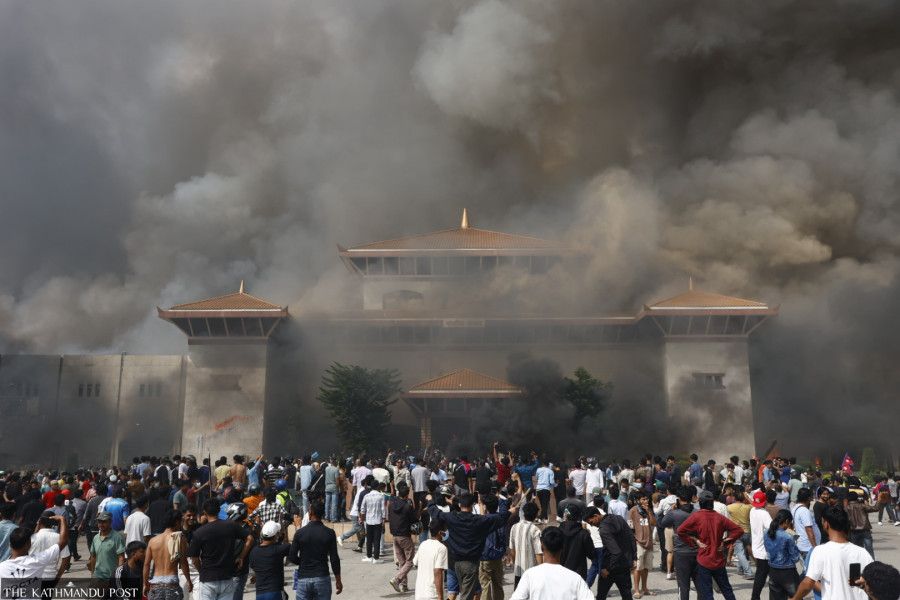Politics
How to form transitional government
Legal experts see two options: Naming a sitting lawmaker as prime minister, or letting the President name a Gen Z candidate as PM.
Binod Ghimire
As talks on the formation of a new transitional government continue, it is unclear how the process will unfold legally.
Gen Z youths, who toppled the KP Sharma Oli government through street protests, want the formation of a government under a non-political leader. As the present parliament is intact, having a non-member of the House of Representatives as the executive head is not possible constitutionally. The protestors are therefore demanding the dissolution of the lower house.
As per the Constitution of Nepal, the President, on the recommendation of the government, can dissolve the House. President Ramchandra Paudel is citing the constitutional barriers for his failure to act as per the protestors’ demands, according to informed sources.
Constitutional experts say there are two options. The first one, which is legitimate but has slim chances of being accepted, is appointing one of the current members of the lower house as prime minister. “The President can appoint any member of the parliament chosen by Gen Z as prime minister. Based on the recommendation of the Cabinet led by the new prime minister, the President can dissolve Parliament,” said senior advocate Bipin Adhikari, professor at the Kathmandu University School of Law.
After consultations, a new Cabinet can be appointed based on whom Gen Z want. The new government then holds elections within six months and hands over power to elected representatives. “This would be a legitimate transition. However, the chances are slim because calls to dissolve Parliament and appoint non-political figures as prime minister are growing,” said Adhikari.
The second option is the President, as head of state, appointing a unanimous candidate proposed by Gen Z as prime minister, says Adhikari. Though the constitution has no room for such appointments, it is not uncommon to go beyond the set constitutional and political principles after a people’s movement, according to Adhikari.
“In any case, the transitional government should hold elections and hand over power to the elected one within six months. We should not be thinking beyond parliamentary democracy,” said Adhikari.
Some other experts say the country is already in a state of political and constitutional vacuum. “We want everything to move as per the constitutional spirit. However, it doesn’t look possible when it comes to government formation,” said senior advocate Dinesh Tripathi. “Appointing a common candidate of the protestors as prime minister seems to be the only option left.”
Echoing Adhikari, he also says that the transitional government should work with a target to hold elections at the earliest possible and handing over the authority to the legitimate force.
Currently the Nepali Army, which is taking the security command, is also leading the talks with the protestors. Security experts say the country is in safe hands as the army has no political ambitions. “The Nepali Army has no political ambitions. I believe it wants the formation of a transitional government as soon as possible. Most probably it will happen by Thursday evening,” said former army major general Binoj Basnyat, a security and geopolitical expert. The civilian government of non-political experts from different sectors will take the stalled course ahead, he said.
Along with elections preparations, formation of an independent panel to investigate the killings of 20 Gen Z youths should be another priority of the government, say experts. At least 20 youths lost their lives due to excessive use of force by the police on Monday. Scores of others have been injured— with around a dozen in critical condition.
“Everyone involved in the killing must be prosecuted after a fair investigation,” said Adhikari. Investigating the property of top political and non-political leadership and bringing the corrupt under law should be another priority of the government.
“Also everyone involved in causing unimaginable loss to the nation by destroying national and private properties should be brought under law. They should not be spared under any pretext,” said Tripathi. Hundreds of structures including the central offices of the executive, legislature and judiciary have been reduced to ashes. Equal numbers of private properties, shopping malls, hotels, schools, and resorts have also been destroyed.
“If the government can do these three major things, it will generate hope amid mounting pessimism. On the other hand, if it fails, the country will plunge into a deeper crisis. Nepal has very challenging days ahead,” said Tripathi.




 19.12°C Kathmandu
19.12°C Kathmandu















